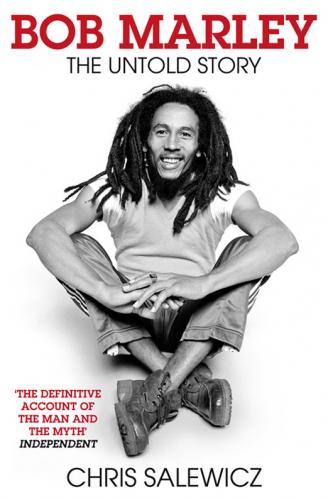BOB MARLEY THE UNTOLD STORY
CHRIS SALEWICZ
For Dickie Jobson (14 November 1941–25 December 2008)
and Rob Partridge (2 June 1948–26 November 2008)
Contents
Sources
Praise for Chris Salewicz’s Redemption Song
About the Publisher
ME ONLY HAVE ONE AMBITION, Y’KNOW. I ONLY HAVE ONE THING I REALLY LIKE TO SEE HAPPEN. I LIKE TO SEE MANKIND LIVE TOGETHER – BLACK, WHITE, CHINESE, EVERYONE – THAT’S ALL.
In early 1978 I spent two months in Jamaica, researching its music and interviewing many key figures, having arrived there on the same reggae-fanatics’ pilgrimage as John ‘Johnny Rotten’ Lydon and Don Letts, the Rastafarian film-maker. My first visit to the island was a life-changing experience, and I plunged into the land of magic realism that is Jamaica, an island that can be simultaneously heaven and hell. Almost exactly a year later, in February 1979, I flew to Kingston on my second visit to ‘the fairest land that eyes have beheld’, according to its discoverer, Christopher Columbus, who first sighted the ‘isle of springs’ in 1494. Arriving late in the evening, I took a taxi to Knutsford Boulevard in New Kingston and checked into the Sheraton Hotel.
Jet lag meant that I woke early the next morning. Seizing the time, I found myself in a taxi at around quarter to eight, chugging through the rush-hour traffic, rounding the corner by the stately Devon House, the former residence of the British governor, and into and up Hope Road. ‘Bob Marley gets up early,’ I had been advised.
Arriving at his headquarters of 56 Hope Road, trundling through the gates and disgorging myself from my Morris Oxford cab in front of the house, there was little sign of activity. On the wooden verandah to the right of the building was a group of what looked like tough ghetto youth, to whom I nodded greetings, searching in vain for any faces I recognised. In front of the Tuff Gong record shop to the right of the house was a woman who wore her dreadlocks tucked into a tam; she was sweeping the shop’s steps with a besom broom that scurried around the floor-length hem of her skirt. A sno-cone spliff dangled from her mouth. Wandering over to her, I introduced myself, mentioning that I had been in Jamaica the previous year writing about reggae, showing her a copy of the main article I had written in the NME. She was extremely articulate, and I discovered that her name was Diane Jobson and that she was the inhouse lawyer for the Tuff Gong operation (over the years I was to get to know her well; and her brother Dickie, who directed the film Countryman, became a close pal).
Then a 5 Series BMW purred into the yard. Driven by a beautiful girl, it had – like many Jamaican cars – black-tinted windows and an Ethiopian flag fluttering in the breeze from an aerial on its left front wing. Out of it stepped Bob Marley. He greeted the ghetto youth, walked towards them, and began speaking with them. On his way over, he registered my presence. After a couple of minutes, I walked towards him. I introduced myself, and he shook hands with me with a smile, paying attention, I noticed, to the Animal Rights badge that by chance I was wearing on my red Fred Perry shirt; again, I explained I had been to Jamaica for the first time the previous year, and showed him the article. He seemed genuinely interested and began to read it. As he did so, like Bob Marley should have done, he handed me a spliff he had just finished rolling. Nervously, I took it and pulled away.
After a minute or two Diane came over. Gathering together the youth, she led them in the direction of a mini-bus parked in the shade that I had not previously noticed. Bob made his excuses – ‘We have to go somewhere’ – and walked over to the vehicle. Then, as he stepped into it, he turned. ‘Come on, come with us,’ he waved with a grin, climbing down out of the vehicle and holding the door open for me.
I hurried over. Ushering me into the mini-bus, Bob squeezed up next to me on one of its narrow two-person
